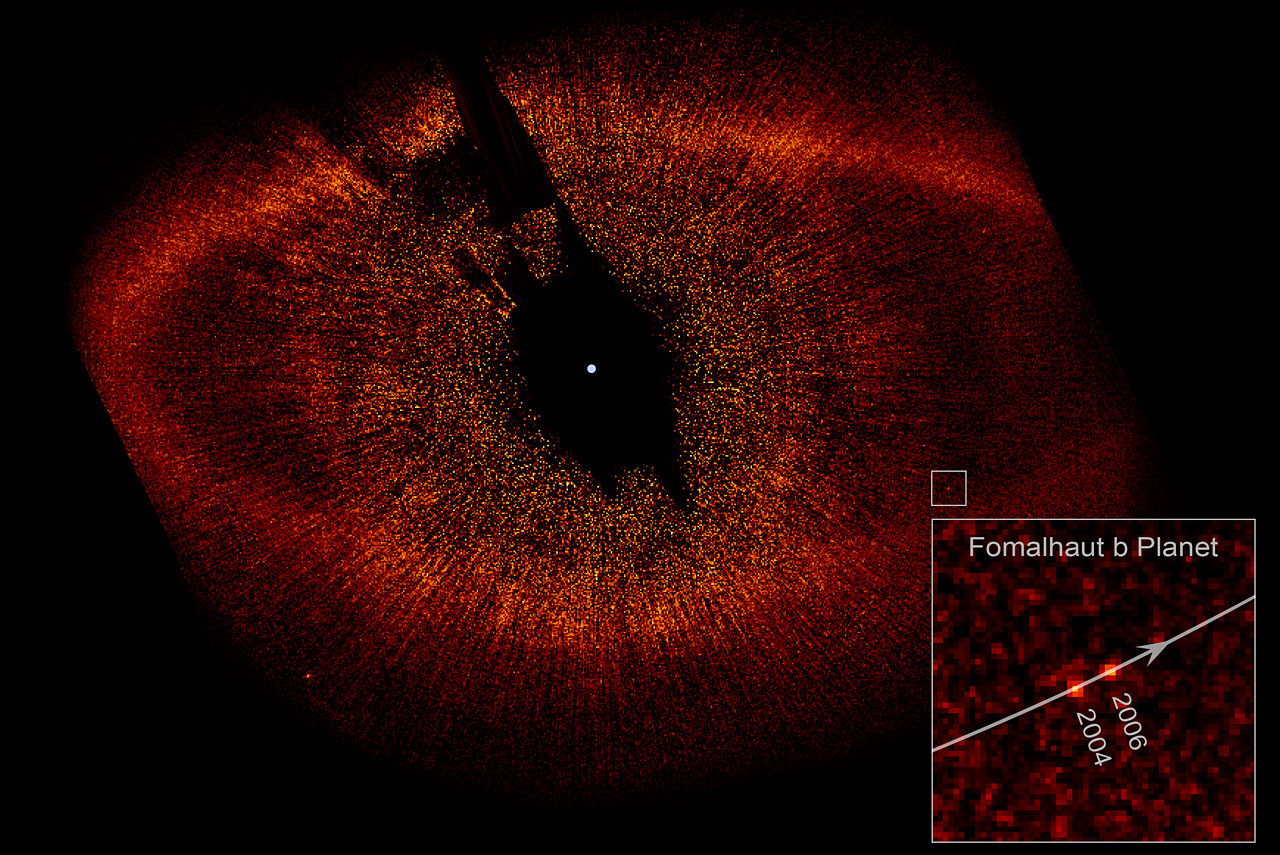

Hubble's view showing a possible exoplanet Fomalhaut b (NASA/HST)
[/caption]
An exoplanet – or extrasolar planet – is a planet which orbits a star other than our own Sun.
After a bit of a false start – lasting many decades! – when a small number of detections of planets around other stars were reported but not confirmed, the first reliable, independently confirmed exoplanet was discovered – by Campbell, Walker, and Yang – in 1988 (though solid confirmation came only in 2003), around Gamma Cephei. Between 1988 and 2003, two planets were detected, and confirmed, orbiting a pulsar (which has the catchy name of PSR 1257+12) – in 1992 – and an exoplanet was discovered, and confirmed, around the ordinary (main sequence) star 51 Pegasi (in 1995). It was this discovery that started the modern exoplanet gold rush.
There are now nearly 400 exoplanets detected and confirmed (and a few more whose status is uncertain). The Extrasolar Planets Encyclopaedia is a website which keeps track of all announcements, confirmations, etc. It also has an excellent tutorial on the methods used to discover such planets.
The first multiple system – a star with more than one exoplanet – discovered was Upsilon Andromedae (this star is actually a binary, so the discovery was a first in two ways). The first planet was discovered in 1996, and the second (and third!) in 1999. In this case independent confirmation came quite quickly. Today more than 20 such multiple-planet systems are known.
Most exoplanets have been discovered by the radial velocity, or Doppler, method: the star’s apparent speed away from (or towards) us – as measured by sensitive spectrographs – varies in a regular way, due to the gravitational pull of the exoplanet (remember that two bodies in a stable gravitational system will orbit the center of mass). Almost all have been found by ground-based telescopes. This is likely to change in the next few years as dedicated space-based telescopes – such as NASA’s Kepler and the ESA’s COROT – continue to make new discoveries. As these use the transit method (detecting tiny changes in a star’s intensity, as an exoplanet goes between it and us), the Doppler method may soon lose its ‘most exoplanets discovered’ status.
There are literally dozens of Universe Today stories on exoplanets! Here are a few, covering many different aspects: Smallest Terrestrial Exoplanet Yet Detected, Astrometry Finds an Exoplanet, Exoplanet Has Oddball Orbit, New Technique Allows Astronomers to Discover Exoplanets in Old Hubble Images, Carbon Dioxide Detected on Exoplanet HD 189733 b, and Exoplanet Image Confirmed.
There’s also a great overview of this topic in the Astronomy Cast episode A Zoo of Extrasolar Planets, and the somewhat older episode Discovering Another Earth is excellent too.
Source: Wikipedia
Now is the best time to observe Mars in 2025. Mars from 2014. Credit: Paul…
Scheduled for launch in 2027, the Nancy Grace Roman Telescope is slowly being readied for…
Few places in the solar system are better suited to a balloon than Titan. The…
We reported before about a NIAC-funded project known as the Lofted Environment and Atmospheric Venues…
The InSight Lander arrived on Mars in 2018 to study the planet's interior. Its mission…
It has been thought that the existence of plate tectonics has been a significant factor…